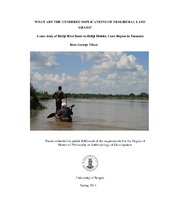| dc.description.abstract | Abstract This thesis explores the gendered implications of the neoliberal land grab in Rufiji River basin in Tanzania. I set out to deconstruct the taken for granted assumptions concerning the state/legal approaches in the implementation of the neoliberal land grab, especially as how the grabs relate to the Warufiji gendered land relations as well as the multiple meanings of land in the basin. In the thesis I argue that most of the taken for granted Tanzanian government oriented neoliberal land grab practices do not correspond with the social, cultural, economic set up of Warufiji lives. An overarching inspiration to the research here and the argument of the thesis comes from Foucault's concept of power-knowledge' and his critique of objective truth'. According to Foucault truth' is relative because each society has its regime of truth. Thus, what is true in one society might not necessarily be true in another. Based on Foucault's concept of objective truth', I argue that the meaning of land is not homogenous; people and communities conceptualize and understand land in unique, distinct ways. For instance to Warufiji land is conceptualized in three categories namely: first, the bare land with no crops, second the bare land with crops and third the crops especially mango, coconut and cashew trees. Warufiji conceptualization of land is thereby contrary to state/legal definition of land which is understood to encompass soil above and below the surface of the earth with plants germinated or grown on it, buildings, rocks and mountains. Therefore a critical understanding of the current land grab process in Tanzania should be understood beyond formal, legal or state oriented approaches and instead examined in a specific contexts and how these articulate with/are in conflict with local conceptions relating to gender as well as the socio-cultural order in general. In this context, gender dimension is central to the ongoing neoliberal land grab in Tanzania because land market relations are inherently gendered and have gendered effects. I have therefore used gender as an analytical tool to examine the way men and women are affected in the process of land commodification. I have seen that land commodification contradicts what I have termed the Warufiji organic nature regime and the Warufiji broader social, political, economical and cultural framework in such matters as the meaning of land, land ownership and control, gendered division of labour to mention a few aspects. In this thesis I have argued that Warufiji men and women are differently impacted as a result of the neo liberal land grabbing process. In this way, the subject of my thesis contributes to a broader debate concerning the anthropology of the gendered impact of the neoliberal land grab in Africa. Key words: Land grab, Neo-liberalism, Gender | en_US |
